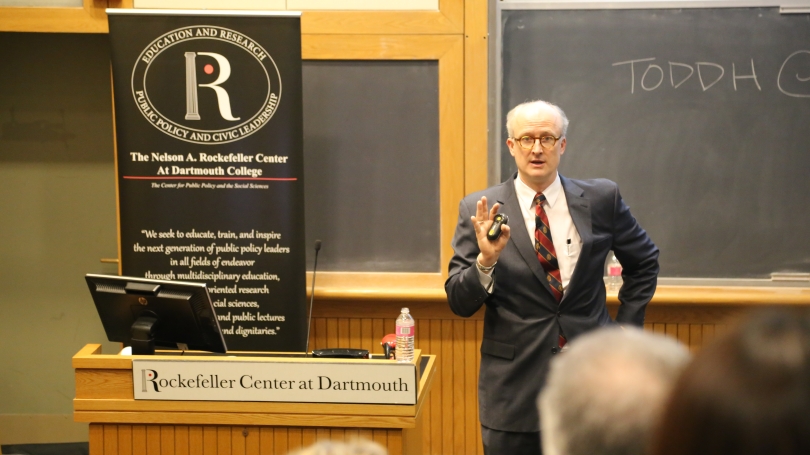
- Public Policy
- Leadership
- Funding
- News & Events
- About the Center
Back to Top Nav
Back to Top Nav
Back to Top Nav
Back to Top Nav
As part of the Thurlow M. Gordon Lecture 1906 Lecture series, the Rockefeller Center hosted Todd Henderson, the Michael J. Marks Professor of Law and Mark Claster Mamolen Research Scholar at the University of Chicago Law School, who gave a presentation in Rockefeller 003 on the importance of societal trust in human progress and the role of trust-creating institutions.
Henderson introduced his presentation with the assertion that the norm of “stranger danger” ends up being highly limiting since individuals ends up forgoing many potential opportunities. Therefore, Henderson asserted that the cultivation of societal trust is the key to prosperous economies since it allows individuals to be more willing to engage in cooperative endeavors. He then transitioned into an overview of the institutions which have historically been guarantors of societal trust, as well as their pitfalls.
Governments, he argued, are only effective so long as the power of the state can be projected, so long as its agencies are resilient to the influence of special interests, and so long as the benefits of regulation do not outstrip the costs of regulation. Businesses, through shared profit incentives, can implement industry-wide self-regulation, but such a system breaks down when the incentives to cheat are large. And as for personal networks, they are limited in scope.
Henderson explained that societal trust is both cumulative (i.e.., increased societal trust via one institution can compound with increased societal trust via another) and scalable. The subject of scalability, particularly through technological and intellectual innovations, comprised the body of Henderson’s remarks.
According to Henderson, the future of government is going to be disrupted by the advent of business employing trust-creating technologies, with immense society-wide benefits. To evidence this claim, Henderson used Uber as an example, arguing that Uber’s system of verifiable driver and passenger ratings, real-time GPS tracking, and responsive customer feedback apparatuses offers an unparalleled boon to societal trust.
In an interview, Henderson further explored this subject. He noted that U.S.. currency having the words “In God We Trust” written on it promotes the need for an external deity for the people to trust in, because fiat money alone is valueless. With more people growing tired of governments and businesses being compromised for money and power, diverse forms of currency are being created, founded on personal trust, which Henderson thinks will be a good thing
However, in a world that is faster, smarter, and larger – all qualities that pose additional risk – why would we trust each other? His answer: “the trust gap,” which is being closed by technology’s ability to deliver personal trust. Henderson explained that he would never send his child in a cab, possibly an Uber, but he would definitely use GoNanny, an app that provides nanny services. The app rigorously vets its nannies, allows customer feedback, and is convenient. This doesn’t fully answer the question of “why,” but Henderson further explained that social technologies take advantage of being the next best alternative – GoNanny vs. finding and vetting your own babysitter, a cab vs. Uber, a hotel vs. Airbnb. Technology is scaling this personal trust, placing it in our hands, and allowing us to do with is as we wish – we just have to trust it with that reason being up to you.
Written by Brian Bliek ’18 and Mariah Reese ’17, Student Program Assistants for Public Programs
The views and opinions expressed, and any materials presented during a public program are the speaker’s own and do not necessarily represent the views and opinions of the Rockefeller Center or constitute an endorsement by the Center.